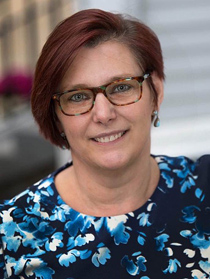
Faith
... even as a teacher widely respected for his brilliance, Joseph Ratzinger remained a student dedicated to following wherever the star of divine truth would lead him.

Wolfe
There's no doubt that God speaks through the Bible, but sometimes, it's very personal. There have been numerous instances when Andrew and I have looked at each other after a reading at Mass with the conviction it was directed to us written all over our faces. Of course, nothing at all revolves around us -- least of all the lectionary. And yet, it's been uncanny at times, so much so that neither one of us has been able to abandon the notion that, in some mysterious way, we were intended to hear a particular passage of Scripture at a precise moment of our lives.
The Church's calendar speaks, too, and sometimes quite eloquently. St. Maria Goretti died of her wounds on the feast of the Most Precious Blood. Convert and martyr St. Edith Stein was born on Yom Kippur, the Jewish Day of Atonement. History, too, seems to speak in this way. The liberation of France at the close of World War II, for example, was achieved on May 8, 1945: the anniversary of St. Joan of Arc's first major military victory and the turning point of the Hundred Years' War. More recently, we recall the death of Pope St. John Paul II providentially on the vigil of Divine Mercy Sunday, an observance he had personally sponsored and promulgated throughout the Church.
The loss of Pope Emeritus Benedict, I think, speaks similarly. It seems to me no coincidence that the man born Joseph Ratzinger would be laid to rest on the traditional vigil of Epiphany. Without arguing about whether such solemnities should or shouldn't be moved to Sundays, we can recognize that Epiphany is, in some ways, a theme of Pope Benedict's life and a revealing lens through which to consider his service to the Church.
Interestingly, priest and professor Ratzinger was brought to the Second Vatican Council as a peritus, or expert, by the Archbishop of Cologne. Construction of Cologne's Cathedral of St. Peter there was begun in 1248 to house the relics of the Magi, which had been sent to Germany from Milan by the Holy Roman Emperor Frederick I in 1164. Yes, you read that right: Cologne boasts the relics of the Magi, the three kings or "wise men" who suddenly appear in the Christmas story recorded only in Matthew's Gospel. The enormous gothic structure remained unfinished for centuries but was finally completed according to its original medieval design in 1880. Today, Cologne's cathedral remains the most-visited place of interest in all of Germany. As Father Ratzinger's intellectual talents drew the attention of Church leaders, a connection between him and the wise men of ancient times who followed a star to Bethlehem was forged.
It was a connection that characterized his entire life. Over the years, Ratzinger taught in several German academic institutions, and his theological positions shifted in significant ways. That is because even as a teacher widely respected for his brilliance, Joseph Ratzinger remained a student dedicated to following wherever the star of divine truth would lead him. For him, that meant accepting election as pope. It also meant relinquishing the Chair of Peter and dedicating his remaining years to penance and prayer.
In the days since Pope Benedict's death, I have seen various headlines and descriptions that seem to sell him short. The pope emeritus did not love faith and reason; he loved the God who gave us both and kept his pursuit of truth focused on the giver rather than his gifts. Benedict XVI was not a "scholar" or "theologian" as much as he was a disciple who listened to the voice of Christ and sought to embrace the will of God. He was not just a churchman but, in every way, a wise man for our times -- one who showed us all what it looks like to journey in faith, to put one's life at the service of the Gospel, and to follow Jesus.
Every wise man's journey ends in Bethlehem. It is fitting that the universal Church ushers Pope Benedict XVI into the presence of God at Epiphany. Imagine what a blessing it must be for him to see the one he has sought all his life face to face, to stand in the light of God's full revelation, to be gathered into the kingdom by the chief shepherd of the flock, and to enter the eternal wedding supper of the Lamb. We are all seeking. May God make us as wise in the search as he was.
- Jaymie Stuart Wolfe is a Catholic convert, wife, and mother of eight. Inspired by the spirituality of St. Francis de Sales, she is an author, speaker, and musician, and provides freelance editorial services to numerous publishers and authors as the principal of One More Basket. Find Jaymie on Facebook or follow her on Twitter @YouFeedThem.
Recent articles in the Faith & Family section
-
The Christmas crecheFather Robert M. O'Grady
-
Feeling like ChristmasJaymie Stuart Wolfe
-
Parish priests and their peopleMsgr. Frank Kelley
-
Be the carolArchbishop Richard G. Henning
-
Give a Christmas Gift to the MissionsMaureen Crowley Heil


















